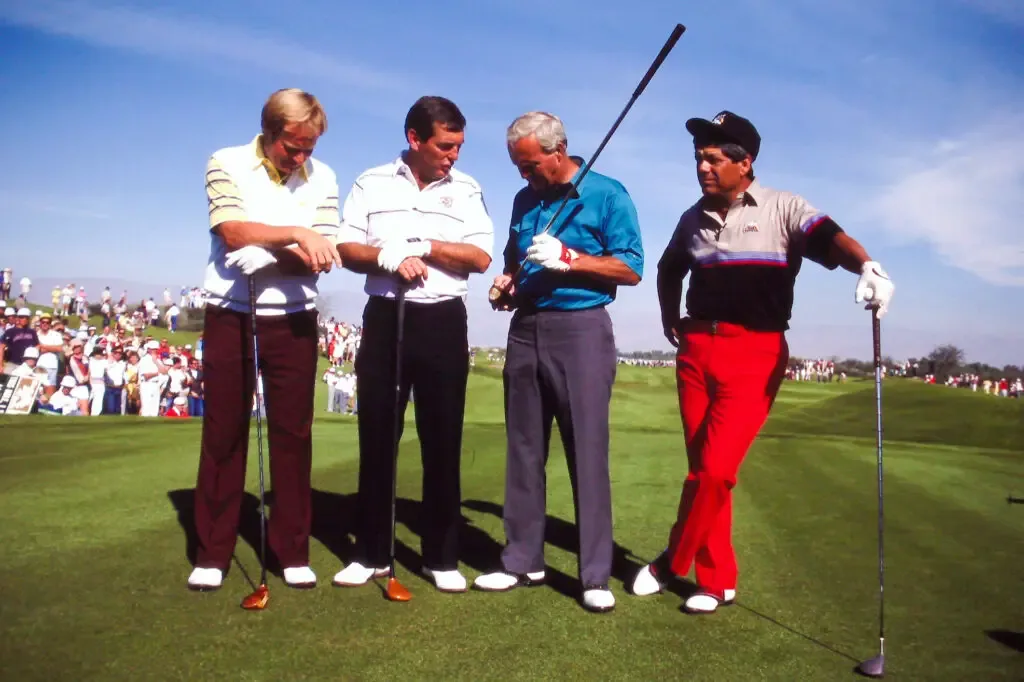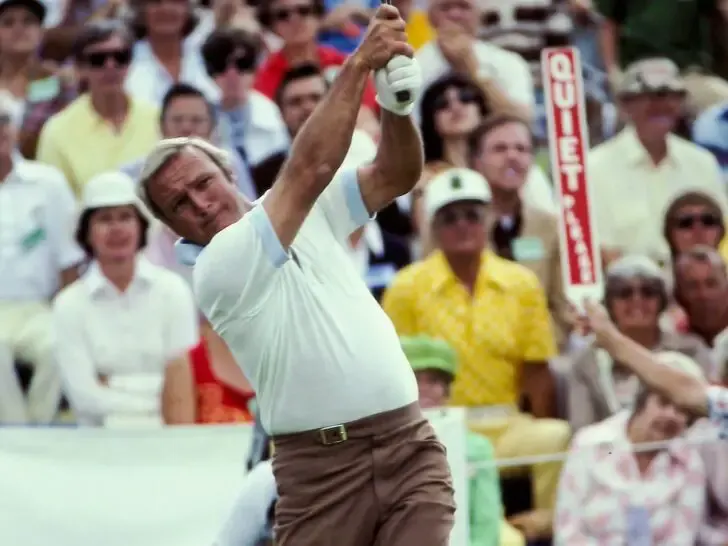Arnold Palmer, affectionately known as “The King,” left an indelible mark on the world of golf, with many of his greatest achievements occurring at the Masters Tournament.
With four green jackets to his name, Palmer became synonymous with Augusta National.
Early Days at Augusta National
As the reigning U.S. Amateur champion, Arnold Palmer made his Masters debut in 1955, finishing tied for 10th place.
Over the next few years, Palmer’s game improved, and he consistently finished near the top of the leaderboard.
This early success set the stage for his first green jacket victory in 1958.
A Star Is Born: Palmer’s First Masters Victory In 1958
Arnold Palmer’s first Masters victory in 1958 set the stage for his illustrious career at Augusta.
The 28-year-old golfer captured the green jacket with a final score of 284 (-4), showcasing his tenacity and flair for the dramatic.
The victory marked the beginning of Palmer’s dominance in the sport and solidified his status as a rising star.
Related: 19 Facts About the Masters That You Probably Didn’t Know
Two For The King- 1960
Palmer’s victory at the Masters in 1960 demonstrated his exceptional ability to perform under pressure.
He birdied the final two holes to edge out Ken Venturi by one stroke, finishing with a score of 282 (-6).
This win was a testament to Palmer’s tenacity and further cemented his reputation as a force to be reckoned with at Augusta.
The Third Green Jacket- 1962
Arnold Palmer captured his third green jacket in 1962 after an exciting 18-hole playoff against Gary Player and Dow Finsterwald.
With this win, Palmer continued to solidify his status as one of the all-time greats at Augusta National Golf Club.
Final Masters Win – 1964
Arnold Palmer’s last Masters triumph came in 1964 when he captured his fourth green jacket in dominant fashion.
Palmer led wire-to-wire, opening with a 6-under-par 66 in the first round and never relinquishing the lead.
His final round 70 secured a total score of 12-under par, giving him a comfortable six-stroke victory over Jack Nicklaus and Dave Marr.
This victory made Palmer the first player to win four Green Jackets and solidified Palmer’s status as a Masters legend.
Related: Swingin’ Sixties: The Most Iconic Golfers Who Defined the Golden Era of Golf
An Enduring Presence: Palmer’s Influence on the Masters
Even as his reign at Augusta came to a close, Palmer’s influence on the Masters Tournament and the sport of golf continued to grow.
As a fierce competitor and charismatic ambassador for the game, he played a significant role in popularizing golf and attracting new fans to the sport.
His demeanor and aggressive playing style captivated audiences and inspired a new generation of golfers, including future legends like Jack Nicklaus and Tom Watson.
Palmer’s impact on the game transcended his performances on the course.
He also played a significant role in popularizing golf on television and expanding the sport’s reach to a broader audience.
As one of the first true golf superstars, he attracted new fans and elevated the game’s status in the public eye.
Palmer’s commitment to the Masters extended beyond his playing career.
He served as an honorary starter for the tournament from 2007 to 2016, hitting the ceremonial first tee shot alongside fellow legends Jack Nicklaus and Gary Player.
This annual tradition highlighted Palmer’s enduring connection to Augusta and his unwavering passion for the game.
Related: Masters Par 3 Contest: A Fun Prelude To The Main Event
A Lasting Legacy: The King’s Impact on Golf

Arnold Palmer’s Masters legacy is characterized by thrilling victories, an indomitable spirit, and a love for the game that transcended the golf course.
The King’s reign at Augusta National Golf Club remains an integral part of the Masters’ rich history, inspiring generations of golfers to pursue their dreams and challenge the limits of what’s possible in the sport.
As we remember Arnold Palmer’s remarkable career at the Masters, we celebrate not only his impressive achievements but also the enduring impact he left on golf as a whole.
The King’s reign at Augusta may have ended, but his influence on the sport will forever be etched in history.

